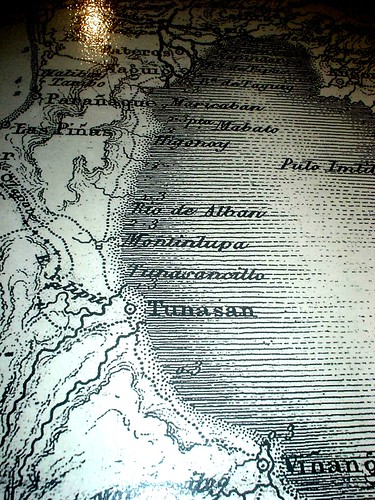
My friend and I were trying to find an interesting article that we could come up with to be published in our company's journal a few months back. Unfortunately we still haven't been able to put up anything there, for some this tid bits of ancient days is something not to be bothered with.
Anyways he came up with this topic out of his head, the origin of the name of this prosperous baranggay, Alabang, Muntinlupa's financial district - where our office stands. He told me of a map he found in Calamba that showed that the river that runs through is name Rio de Alban. The crazy people that we are, visited Calamba and true enough the river was called Rio de Alban, this is the small river you'd see if ever you visited Filinvest Festival mall. I'm not sure why its now known Mangangati, I did look at some modern maps where it is referred to as Alabang river.
A visit to the Muntinlupa Public library, one can grab a copy of the History of Muntinlupa. Funded by then Mayor Fresnedi, it was more of a campaign brochure than a history book with all the picture of the Mayor and his aides doing public service in different area of the city. It did provide some helpful information, like theories of the origins of names of all the baranggays and other places in the city. Alabang according to the book was from the tagalog word 'Abang' - the town according to old accounts was teeming with bandits. They would wait in patiently (abang) to ambush hapless villagers and traders in the road leading to Manila.
Alban is of latin origin, meaning 'from Alba' - the ancient Roman ethnic city of Alba (whites). Its also the name of the 1st british christian martyr, St. Alban. But I doubt if the mostly Spanish Augustinian's in Tunasan gave him the honor.
Reason led me to believe that the Alban is the true origin of word Alabang. My friend was right. In this town, one could notice the usual changing of the spelling of last name and some places - efforts to convert into tagalog letters name's originally of Spanish beginning, like the popular last name Buñe becoming Bunyi, the town name from Monte to Munting. This has resulted to losing the words inceptive meaning. There was a time when Muntilupeños found it convinient to get rid of their Spanish sounding last name, the attitude of repulsion towards anything Spanish.
Origins of words and name's of places tells us stories of the past. It would make me really happy that a day would come when none of us can change this names no more. Let's keep this name for they will tell the future generation what we were like. Sometimes the name tells it all.



No comments:
Post a Comment